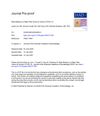TLDR There's no significant genetic link between male pattern baldness and COVID-19.
The study investigated the potential shared genetic basis between male pattern baldness (MPB) and COVID-19 by analyzing genome-wide association study (GWAS) data from sources like the UK Biobank and The COVID-19 Host Genetics Initiative. Using linkage disequilibrium score regression (LDSC) analysis on approximately 1,000,000 autosomal SNPs, the researchers found no significant genetic correlation between MPB and COVID-19 phenotypes. However, they noted limitations such as self-reported baldness data and the exclusion of X-linked genetic factors, suggesting that specific genes, including those on the X chromosome, might still influence the risk for both conditions.
 26 citations
,
September 2020 in “Journal of the European Academy of Dermatology and Venereology”
26 citations
,
September 2020 in “Journal of the European Academy of Dermatology and Venereology” A certain genetic variant in the androgen receptor may predict the severity of COVID-19 in men.
 29 citations
,
July 2020 in “Journal of The American Academy of Dermatology”
29 citations
,
July 2020 in “Journal of The American Academy of Dermatology” Men with severe balding have a higher risk of getting very sick from COVID-19.
 58 citations
,
December 2018 in “Nature Communications”
58 citations
,
December 2018 in “Nature Communications” Male pattern baldness is mostly inherited, involves many genes, and is linked to other traits like early puberty and strong bones.
 April 2024 in “Human genomics”
April 2024 in “Human genomics” Identified genes linked to male-pattern baldness may help develop new treatments.
 57 citations
,
November 2017 in “Nature Communications”
57 citations
,
November 2017 in “Nature Communications” Researchers found 71 genetic regions linked to male pattern baldness, which account for 38% of its genetic risk.
 64 citations
,
March 2017 in “Nature communications”
64 citations
,
March 2017 in “Nature communications” Researchers found 63 genes linked to male-pattern baldness, which could help in understanding its biology and developing new treatments.
 25 citations
,
March 2012 in “Journal of Dermatological Science”
25 citations
,
March 2012 in “Journal of Dermatological Science” Genetic variants linked to ten skin diseases were found, showing both immune and non-immune factors play a role.
 March 2025 in “Human Genetics and Genomics Advances”
March 2025 in “Human Genetics and Genomics Advances” Genetic predictions of baldness in Europeans don't apply well to African men.








